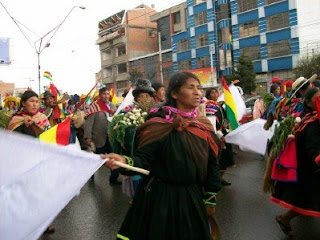Llajtaymanta
Tuesday, February 24, 2009
JALLU PACHA IN HUACULLANI


Jallu Pacha is an aymara expression and it means time of rain. During this time, in rural area people thank to mother land for the good production. So, yesterday Monday 23 Huacullani, a rural town was de place where people from the different communities from Tihuanacu meet there to thank to pachachamama (mother land) and to celebrate the production of potatoes and other local products.
Each rural community arrived to the main square of Huacullani with flowers, music and dance playing local rhytms such as tarqueada, pinkillada.
Saturday, February 21, 2009
CARNIVAL HAS STARED
Carnival has started in Bolivia. Today there was a ch´alla. A ch´alla is a kind of ceremony where people thanks about what he or she has. Today public and most private offices worked only until two or tree in the afternoon. It was because, it it usual thay employes maka ch´alla in their offices or factories. They ch´allan their desks, their computers and all the instruments they use in the work. All the celebration during theses times, is accompanied by music, better ch´utas as we see in the video and tarqueadas.
Wednesday, February 18, 2009
MOTHER WATER
I know there are lots of families in the world who don´t have clean and safe water. But nature is generous too as in this case. Water flows permanently for years and years. Water goes to Titicaca Lake but I don´t know where it comes from. Families of Yumani town collect water from this place early in the morning everyday and it is carried on donkeys up to the houses.
Labels:
Bolivia,
indigenous peoples,
La Paz,
Sun Island,
Titicaca Lake,
WATER
Monday, February 16, 2009
MAYATA TUNKARU
Mayata tunkaru is a song composed by a bolivian folkloric group called Awatiñas. The lyrics is in indigenous aymara language and it teaches how to count numbers. The main part says: maya, paya, kimsa, pusi, phisqa, suxta... which means one, two, three, four and the rest of the numbers up to ten.
Wednesday, February 11, 2009
Eyes of hope

About 51% of El Alto population are women, mostly indigenous aymaras. As it has happened for long time, most of them don´t finish school, so when they come to urban areas there are not many opportunities to work. It is worse when there are small children. That´s why, a high percentage of women in El Alto work as sellers in the markets or on the streets. This type of activity allow women to earn some money and, at the same time, to take care of their children.
It can be anyday but during occasions as festivals or other big public events, there is a hope, the hope to sell, to earn something to feed her children.
Monday, February 9, 2009
During February 7th. in El Alto
The song "Viva mi patria Bolivia" is a song that bolivians sing during special occasions. This time it was played by a famous bolivian folk group named Tupay, as part of the celebration for the new bolivian Constitution in El Alto, Bolivia.
PRESIDENT EVO MORALES IN EL ALTO




Last January 25th. bolivians voted for a New Constitution. According to official results option Yes to this New Constitution won with more than 60% of support from the population. So, last Saturday President Evo Morales promulgated this Constitution in El Alto in the middle of a huge quantity of people who came from the indigenous communities and from other cities of Bolivia.
Last Constitution was made in 1967 and a partial reform was made in the 90' s. So, it was important to have a new document that includes indigenous peoples for the first time in the history of Bolivia.
There has been a long process to arrive to this moment in the history of this country. Silvia Lazarte, a woman from indigenous quechua origin, had an important role as President of Constituent Assembly where about more than 100 members elected by population worked to built a new Constitution.
Labels:
Bolivia,
El Alto,
Evo Morales,
indigenous peoples
Tuesday, February 3, 2009
BOLIVIAN VOICES SUMMIT



The first Bolivian Voices Summit took place last weekend in Cochabamba, Bolivia. Bolivian Voices started its activities more than a year ago in order to give voice to underrepresented groups in Bolivia.
Bolivian Voices Director, Eduardo Avila, organized this event where me and other members participated. During three days, people that participated since 2007 in the workshops to learn how to use blogs to show and share information about our cultures, about daily life, etc. in different cities within Bolivia, were able to have this meeting.
It was important for me to participate in this Summit, since it was an opportunity to know other bloggers from Bolivia and work together to analyze what has been done up to now and what else could be done in the future.
One of the activities was a workshop for new bloggers. I found this really interesting, because I met three people who play folk music and I was happy to help them to open their blogs. With the help of Eliana from La Paz, it was also possible to train them how to use twitter.
A public session, a workshop for new bloggers, a sessión only for members of Bolivian Voices, I think was an adecuate combination of activites planned for this succssesful event.
Subscribe to:
Comments (Atom)
Following the steps of my ancestors
SUN ISLAND IN TITICACA LAKE
View more presentations from Cristina Quisbert.









